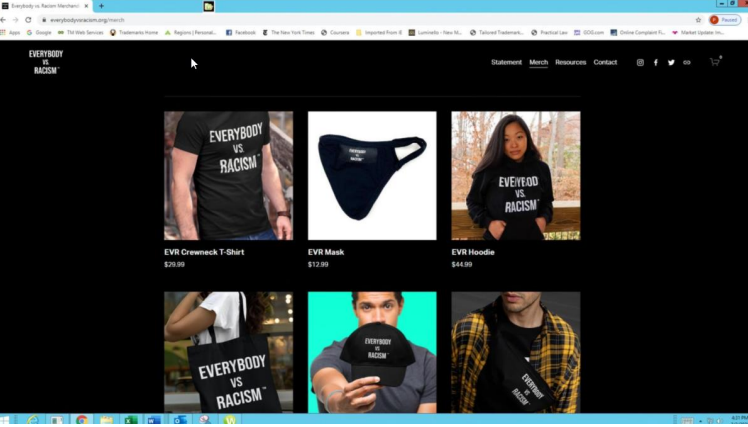In a notable decision by the U.S. appeals court, the phrase “Everybody vs. Racism” was denied trademark registration, setting a significant precedent in trademark law. This ruling underscores a fundamental principle: a trademark must distinctly identify the maker or source of a good or service. Let’s dive into what this means for your brand and how to ensure your proposed trademark meets this critical requirement.

The “Everybody vs. Racism Case” – A Brief Overview
The case centered around an application to trademark “Everybody vs. Racism” for merchandise like tote bags and t-shirts. The U.S. Court of Appeals, aligning with the U.S. Patent and Trademark Office (USPTO), ruled that this phrase is viewed by consumers more as a sentiment than a source identifier for goods or services. The court looked at the plethora of “third-party evidence identified by the examining attorney, but also GO’s specimens and other evidence of its own use of the mark.” Based on the totality of evidence, the Board agreed with the examining attorney that the third-party uses of the mark “show[] that ‘everybody vs racism’ is commonly used in an informational and ornamental manner on clothing items, tote bags, and other retail items sold by third-parties to convey an anti-racist sentiment.” This decision highlights the distinction between a trademark and a mere expression of a message or idea.
What Makes a Trademark a Source Identifier?
A valid trademark serves as a unique identifier, distinguishing a business’s goods or services from those of others. It’s not merely a tool for conveying a message or sentiment. Trademarks should be distinctive and non-generic to avoid confusion and ensure they point back to a specific source or maker.
The decision made emphasized that the use of the logo was simply ornamental. Ornamental use refers to having a logo or slogan on the front of a shirt or hat, as opposed to having it on the label or tag. However, ornamental use alone is not eligible for protection on the Principal register. Therefore, if you plan to use a slogan or logo on the front of your shirt, it is advisable to also use it on the tag to ensure it functions as a trademark.
Learning from the Ruling – Ensuring Your Trademark Complies
To ensure your trademark functions as a source identifier, it’s crucial to conduct thorough market research. It should be distinct and unique, not a common phrase or expression. Consulting with legal counsel is also vital to evaluate the effectiveness and legality of your proposed trademark.
Getting Help Navigating the Complexities of Trademark Law
Trademark law is intricate, and navigating it requires professional legal advice. Working with an attorney can help you develop a strong, legally sound trademark, avoiding common pitfalls and ensuring compliance with legal standards.
When developing your trademark, consider the principles listed above to ensure it effectively represents your business. If you need further assistance in developing a trademark that complies, we’re here to help. Contact us at (888) 666-0062 or click here to schedule an Initial Discovery Session online.
DISCLAIMER: The information contained in this article is for informational purposes only and is not legal advice or a substitute for obtaining legal advice from an attorney.




